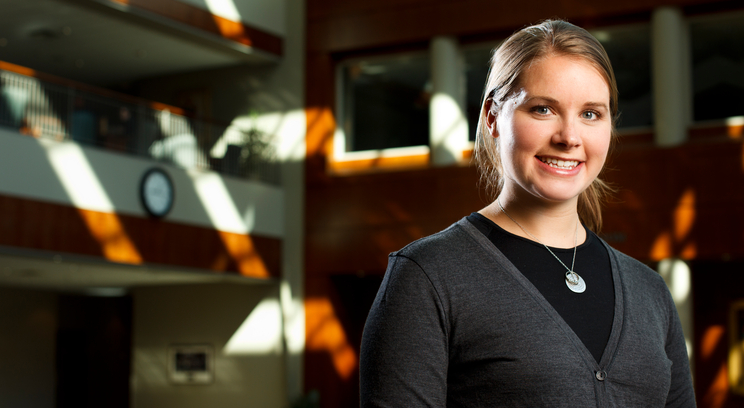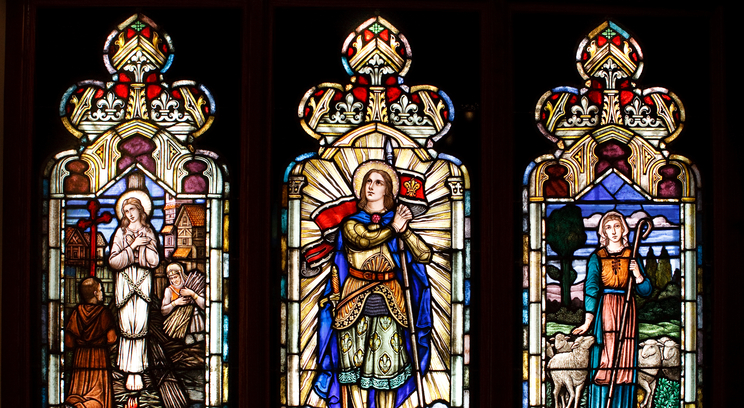As part of its mission to provide an advanced and interdisciplinary course of study for its graduate students, the Master of Arts in Catholic Studies program entered into a collaboration with the University of St. Thomas School of Law to establish a dual JD and MA program. Launched as one of the first dual-degree programs at the law school in 2002, the program seeks to integrate Catholic thought and law studies by awarding advanced degrees in both Catholic Studies (M.A.) and Law (J.D.). Dr. Robert Kennedy, department chair, explains the impetus for the venture. “Catholic Studies is always looking for chances to collaborate with other programs in the university. The establishment of a law school on campus that aimed to have a deliberate Catholic character seemed to us to be a natural and fruitful opportunity for cooperation. This has certainly proven to be true, and we have found many points of mutual interest between the two disciplines.” There are currently three students in the JD/CSMA program, all with diverse backgrounds but one mission: to be a Catholic lawyer, academically trained in both the Catholic tradition and the art of practicing law.
Australian native Dylan Knoll came to the University of St. Thomas School of Law following a secular education in which he majored in political science and German. “At the law school, I have really appreciated that there is a discussion about faith and morals in class – topics that have been basically banished from the classroom at other schools. In Catholic Studies I have enjoyed a refreshing approach to the study of the Church, history and our world today that I have not experienced anywhere else. In my experience, CSMA classes involve honest, reasoned and thoughtful discussions about current problems and their historic roots. The reasoning and analytical skills law school provides and the foundational principles and documents of law prepared me well for Catholic Studies. The whole-person formation that Catholic Studies provides informs my understanding of the law and legal practice.”
Knoll decided to go to law school about a year after he completed his undergraduate degree. “At that time,” he says, “I felt that law would be a practical way for me to serve others and might be a stepping stone to a career in international relations. I chose St. Thomas’ law school because of its Catholic identity, in contrast to my large, secular alma mater. I loved it from the first day. Part of what drew me to a Catholic school was the chance for personal formation and a deepening of my faith. This was what ultimately drew me to the Catholic Studies degree. In spring 2011, my second year at law school, I applied to the Catholic Studies program. I had never taken any philosophy or theology classes, and the interdisciplinary approach of the Catholic Studies Department really attracted me. I hoped it also would give me the Catholic formation that I felt I lacked from my secular schooling days. The program has more than lived up to my expectations.”
Converting from his Buddhist faith to evangelical Christianity and then to Catholicism while obtaining an international studies degree at Baylor University, first-year law student Rachana Chhin not only believes in the intersection of faith and law, but specifically chose this program because of it. “When I was looking at law schools to attend, I was certain that I wanted to be at a Catholic law school. This was because I did not seek to simply be a lawyer, but a Catholic lawyer. St. Thomas’ name kept on popping up again and again as a place that would integrate both faith and reason to this end. As I looked more into the program, UST was also unique in allowing students to jointly pursue both a J.D. and an M.A. degree in Catholic Studies; thus, what distinguished St. Thomas’ program was that the university offered not only solid legal formation but one that was grounded in the rich heritage of the Catholic intellectual tradition.”
“I can already sense how my Catholic Studies will integrate with my law degree,” says Chhin. “The professors at the law school are not afraid to integrate Catholic social teaching into their class discussions. This is not, of course, an uncritical analysis but one that exposes many students to the underlying doctrines and principles that allow future lawyers to approach pressing issues of our day through the lens of the Church’s teaching. One of my favorite classes so far is Foundations of Justice, which strives to help law students gain an understanding of justice that is nourished by an analysis of various philosophical, religious and cultural traditions.”
Kathryn Mollen agrees that the joint program offers a unique yet complementary perspective for Catholics who want to enter the field of law. “The programs are both aiming to do the same thing through a different lens: they equip students to seek out and dialogue about the truth. For instance, my understanding of the Catholic intellectual tradition that I received through the CSMA program has helped me to dialogue with other students in the JD program as we all seek the truth of a particular situation together. The most practical example that I can think of is the abortion debate. CSMA has helped to prepare me to think and speak prudently about issues through a Catholic lens and to dialogue with students in the JD program as we seek the truth about policy reform or funding issues concerning abortion. In this way, the programs complement and build off of each other.”
Mollen worked for some time after receiving her undergraduate degree, but she found that her work was not pushing her intellectually. “I began to look at law schools and chose St. Thomas specifically for the joint degree program. I loved the CSMA program, because it allowed me to immerse myself in learning about my faith. Both programs have been a fantastic decision for me, as both have challenged and shaped the way I think about the world around me.”
Law professor Elizabeth Schiltz believes that the joint program “offers a truly unique opportunity for the student who wants to rigorously explore her faith commitments while developing her professional identity as a lawyer. As a member of the faculty of the law school, I can attest to the fact that it supports integrating students’ faith and the study of the law. As a recent (2010) graduate of the CSMA program myself, I experienced firsthand the quality of both the courses and the teaching in Catholic Studies. I continue to be thankful for the many – sometimes surprising – ways in which a deeper, interdisciplinary understanding of the Catholic intellectual tradition enriches my approach to the law.”
Students in the program earn two graduate degrees (in law and Catholic Studies, respectively, a total of 97 credits), in less time than it would take to earn the two degrees separately. Full-time students can expect to complete the joint program in three and one-half to four years of study. Students must apply for each program separately and meet all admissions requirements in both law and Catholic Studies. Students typically enroll in the School of Law before applying for the Master of Arts degree in Catholic Studies. For more information, contact Dr. John Boyle or Professor Elizabeth Schiltz, or visit the JD/CSMA website: www.stthomas.edu/law/academics/CatholicStudies.
Read more from Perspectives







